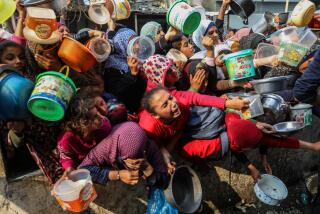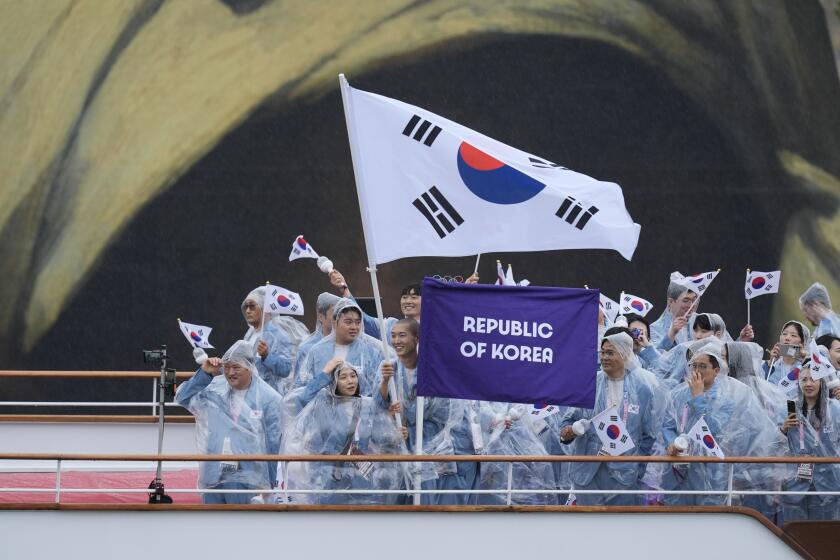Letter from Libya: To live and lose in Misurata
We watched the African refugees wait placidly at the port for the boat to take them out of a city under siege. The day before, one of their own had been killed waiting at the port’s entrance, and today, shells were falling nearby. But they still filed quietly in line.
Then again, we were just sitting there too, counting on our reflexes and the advice someone had given us if the bombardment got too close: Make a dash for the thick steel hull of the docked boat. All the time we were uneasily aware that if we were killed, people might shake their heads and say, those idiots were just sitting out in the open, eating chocolate cookies and date rolls.
We ignored the explosions, because really there was nothing else we could do. It didn’t matter if we were luckier than most residents and had helmets and flak jackets.
Misurata had taught us that no one was spared here.
Photos: Work by photojournalists killed in Libya
We’d come to Misurata nearly two weeks before because it was the last major rebel-held city in western Libya. Excitement with the story, not to mention restlessness over the stalemate in the fighting in the east, had brought us here to document the city’s improbable revolt against Libyan leader Moammar Kadafi.
From my years as a reporter in Iraq, I knew that if I could keep myself somewhat detached from the violence, it was easier to cover. In Iraq, I cared about the people involved, sometimes too deeply. But as long as I was the outsider, it was simpler.
But now, sitting at the port, we weren’t outsiders. We had learned something of what it felt to lose in Misurata.
We — three print colleagues and I — had arrived on the overnight sea voyage from the rebel capital, Benghazi, with the war photographers Chris Hondros and Tim Hetherington. That ride went quickly, with sleep, food and talk, and probably more rest than anyone covering the war in the east had had in days.
The boat, a liner called the Ionian Spirit, had been chartered to rescue immigrant laborers from Misurata, and we had spent the final hours making sandwiches for the 1,000 refugees who would get on board when we arrived there. We blew off steam, teasing a friend mercilessly for choosing to read a dour 1950s-era French existentialist as we sailed a cruise ship into war.
No one had known what to expect in this besieged city in reach of Kadafi’s capital, where we would stay or what would be waiting for us at the port. We tried satellite phone calls to contacts in the city who might meet us and whisk us out of the bombarded harbor. It would be dark when we got in, and the thought of being stranded in the middle of incoming rockets and rioting migrants left us slightly unnerved, even though we joked about it.
But Misurata’s people wanted reporters there. Various community leaders had gathered on the dock, waiting for us, despite the risks of incoming fire, and grabbed the different groups of journalists arriving. Our photographer friends went one direction and we went the other.
On Wednesday, April 20, the four of us had spent the morning and afternoon peering around the front line of Tripoli Street, then Misurata’s main battlefield.
Muad, a combat medic for one of the fighting groups on Tripoli Street, drove us in his sedan, speeding through streets in range of Kadafi soldiers.
Muad helped us distinguish the acoustics of the cluster bomb by virtue of its burst and then the crackle of its small bombs like a baby’s rattle. The explosions kept coming, and we decided it was better to move. Twelve hours later, a Grad rocket would hit the same corner and kill three fighters.
Muad would turn to me and ask, “How are we going to keep fighting?”
That day I felt a charge from running through the city. We kept touring spots along the edges of Tripoli Street, and then in the afternoon we went to the hospital to find out death tolls and talk with doctors, all of us laughing, running on adrenaline.
Then the rebels’ cars careened in with Chris and Tim and their colleagues, Guy Martin and Michael Christopher Brown, all of them wounded.
There was Tim on a gurney, doctors pumping his chest, trying to force him to breathe, his jaw clamped and eyes squinting, his skin turning grayer and grayer and then tightening like a mask.
There was Guy being rushed into the tent, with a cold-blooded and masterly cool, cracking, “It’s a scorcher,” unaware of the strand of intestine hanging from his stomach like a pink kerchief.
A nurse handed us a black helmet coated with blood and brain matter. We just didn’t know it was Chris’ yet
Somehow all of Misurata’s deaths were melding together. In the previous days, we had walked into jammed hospitals and seen a teenager with horrific shrapnel wounds in her groin, young children swaddled in white bandages.
I had been in the same hospital ward three nights earlier, watching a doctor pronounce a man minutes away from death. The stranger had lain under an aqua blue sheet, with an oxygen mask over his swollen face, after having been shot 17 days before. The doctor said that in another hospital in another country the man would probably have survived. The man’s chest heaved.
Chris died at 10:42 p.m. His bed was cleared from the intensive-care unit and his space was filled by others.
I felt ashamed that people were approaching us and telling us they were sorry for our loss, when they had lost so much already, and would lose much more, and carried that burden because they had no choice. They were fighting for their lives, but they had time to grieve with us.
We should have already felt the same empathy.
Ironically, or at least we thought of it that way, the next day would see momentum tip the rebels’ way as much as it could in Misurata. The tactic of cutting off streets with Kadafi loyalists finally started to bear fruit. The several hundred Kadafi soldiers in the city were now low on food and ammunition and isolated from their brethren ringing the city’s perimeter. Soon neighborhood after neighborhood was cleared, and we were left to explore the terrain: the charred buildings riddled with bullet holes and the dead. Men dressed in raincoats and surgical masks pulled out bits of bodies and threw them into yellow plastic bags.
It seemed the rebels had won the city, and Kadafi would shell them from outside. There would be a bloody stalemate. Standing at the port, with shells falling, I felt guilty that I was leaving. But I boarded the boat anyway.
Now, two weeks later, the rebels have gone from moments of fear that Kadafi could use chemical weapons to euphoria after driving Kadafi’s soldiers from the city’s airport. But still they are attacked. A doctor wrote to me by Skype on Friday of the latest shellings and death. He mentioned that a 5-year-old boy and his infant sister had been killed.
It is an open question how long Misurata can go on fighting Kadafi. The east may hold on, but Misurata, so close to Tripoli, has far less certainty.
I think of the medic Muad, who was born in the United States. He was supposed to get married in March and take his wife back to the U.S. Instead, he was fighting for Misurata.
The last time I saw him was the day before I left. A few of us had driven out into the desert just past the port, where the rebels were massing to shell Kadafi’s fighters. I stumbled upon Muad as he stood next to a few ambulances and pickup trucks with mounted machine guns. Rockets had been falling all afternoon and he laughed as he dodged them barefoot. He was hanging around and waiting for whatever happened next. He was half-laughing, half-serious. He knew Kadafi’s forces were in the desert in front of us.
I knew I might not see Muad again. I would probably get on the boat the next day, and would know that he and others who had showed kindness to me might die in Libya’s violence.
Because even though I knew what it was to lose in Misurata, it wasn’t my war.
Photos: Work by photojournalists killed in Libya
More to Read
Sign up for Essential California
The most important California stories and recommendations in your inbox every morning.
You may occasionally receive promotional content from the Los Angeles Times.





